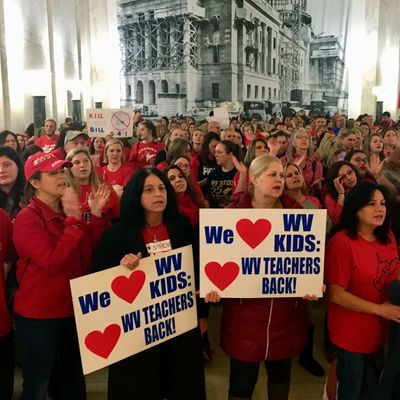
West Virginia school personnel earned what looks like a second major labor victory in two years on Tuesday afternoon. Hours after educators walked out on strike, House legislators voted 53 to 45 to indefinitely table SB 451, a controversial omnibus education bill that has, in most of its many iterations, tied an additional pay raise for school employees to the creation of charter schools and education savings accounts that would subsidize the costs of private education, among other provisions.
The vote is tentatively good news for teachers, but the bill may not be totally dead. In theory, someone could file a motion to reconsider tabling the bill. Education unions will hold a press conference at 7 p.m, and the House is in recess until 6 p.m. On Twitter, the West Virginia Education Association urged members to contact the 12 Republicans who voted to table the bill:
At least one Republican delegate has said he doesn’t plan to file a motion to reconsider the bill:
Prior to Tuesday’s vote, school employees had characterized the bill as retaliation for last year’s history-making strike, which garnered national attention for the state’s comparatively low teacher salaries and helped inspire similar walkouts in Arizona, Oklahoma, and Kentucky. On Monday evening, leaders from the state’s three school employee unions announced a new walkout, nearly a full year after they shut down every school district in the state to demand living wages and funding for the public insurance agency that covers state employees.
In the morning, before SB 451 met its probable demise, teachers expressed frustration with legislators. It’s “disheartening and it’s frustrating that here we are having to participate in our second strike,” Mingo County teacher Katie Endicott told New York magazine as she walked into the Capitol for a rally. Endicott’s husband is also a teacher, so they stood to benefit from a double pay raise. Despite last year’s hard-won victories, West Virginia teachers still earn relatively little compared to public school educators in other states. Even so, Endicott opposed the bill in its current iteration, and said she believed that her new raise would come at the expense of her students. “I’m willing to say, keep the $4,000 because the soul of West Virginia and our students are worth more than $4,000 a year,” she said. “So we’re not going to sell them out.”
Kristina Gore, who teaches in Logan County, urged legislators to focus on other pressing matters, like the state’s opioid crisis. “Teachers agree wholeheartedly we have problems in public education, but if you want to fix them you must first understand those problems are symptoms of a bigger issue,” she told New York. “That issue is the social conditions in which our children live. Instead of trying to treat a symptom with garbage legislation that isn’t even vetted or proven to work, let’s brainstorm some legislation to fix the real problem. Let’s address the drug epidemic.”
Tuesday’s strike placed significant pressure on state legislators, who had been mired in heated negotiations over the omnibus bill. As the West Virginia Gazette-Mail reported, the House version of the bill watered down the Senate’s original proposals for education reform. House legislators removed education savings accounts from the bill, restored seniority as a protective consideration for teachers at risk of being laid off, and capped the number of charter schools at two. The House scheme would have converted public schools to charter schools, but only with majority approval from school parents and employees. Teachers unions are uniformly opposed to the creation of new charter schools, which likely would have become a major obstacle to the implementation of this scheme.
On Monday, Senate leaders countered with new proposals of their own. They unveiled an amended version of the bill that would increase the number of charter schools from two to seven and revive a clause to create education savings accounts, though it did limit these accounts to 1,000 students, down from 2,500 in the version the Senate originally sent to the House.
By Tuesday morning, schools had closed in every county save one: Putnam County, which isn’t far from the state capital, Charleston. Although Putnam County superintendent John Hudson had refused to close school, some school employees appear to have defied him. News Channel WOWK 13 reported that picket lines had still formed at Putnam schools and that some school bus drivers had refused to pick up children. In Charleston, Randi Weingarten, president of the American Federation of Teachers, walked a picket line with educators. Not far away, other school employees, like Endicott, attended a demonstration at the Capitol. Robin Ellis, who also teaches in Mingo County and who traveled to the Capitol with Endicott, told New York that educators are “ready to do battle for public education.” “This will impact our children and our grandchildren and great-grandchildren. And we are ready,” she said. “We are not willing to stand back and replace a system which now offers education to all with a system that discriminates and will create chaos.”
Fifty-three legislators listened. Twelve were Republicans who joined Democrats in the vote to table the bill.
Outside West Virginia, the teachers’ strike wave is poised to continue. In Ohio, educators employed by the Summit Academy charter school in Parma, Ohio, also walked out of class today, making them the fourth charter school to go on strike within the last three months. In December, employees of the Acero network of charter schools in Chicago made labor history by launching the nation’s first ever charter school strike. Public school teachers in Oakland, California, may also strike on Thursday over low pay, growing class sizes, and inadequate resources for students; they have been working without a contract since 2017. Union officials have told the San Francisco Chronicle that 600 teachers left the district last year because they could no longer afford to live in the Bay Area on their salaries.






























